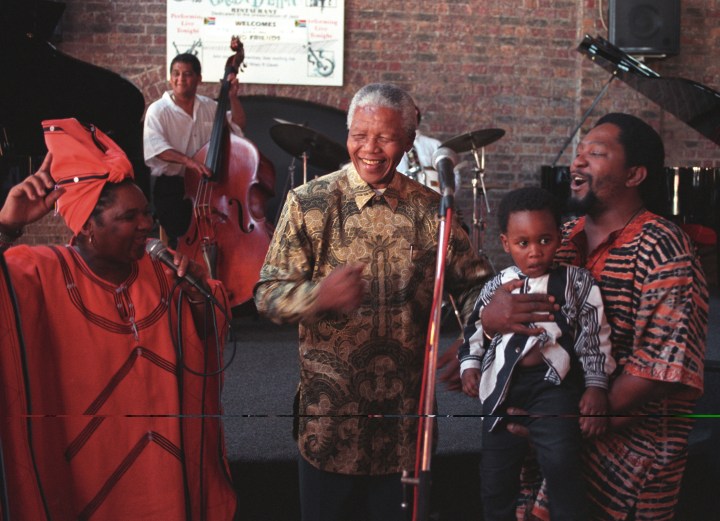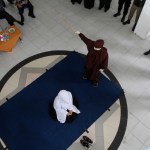THE CONVERSATION
Sylvia Mdunyelwa, one of South Africa’s great jazz vocalists, kept music traditions alive

Not just a great jazz singer, Sylvia Mdunyelwa was also an activist, educator, broadcaster and actress.
If Miriam Makeba is hailed as the South African vocalist of her generation who brilliantly embraced (and actually shaped) global music sounds, and Sathima Bea Benjamin as the experimenter who entranced the modern jazz scene in Europe and the US, then Ncediwe Sylvia Mdunyelwa joins that pantheon of late, great South African singers as the consummate vocal classicist. Known affectionately in her home city of Cape Town as “Mama Kaap”, Mdunyelwa passed away on 25 August at the age of 74.
As a researcher who documents historical and current South African jazz and popular music, I believe Mdunyelwa merits recognition not only for the regard she won from fellow players but also for her activism as a community music educator and advocate for South African jazz.
At the core of her music was a fierce insistence on respect for the tradition – of the great American jazz singers such as Ella Fitzgerald and Sarah Vaughan as well as the traditional music of her isiXhosa-speaking community – and for the song.
Who was Sylvia Mdunyelwa?
Born in the Cape Town township of Langa, Mdunyelwa grew up in those traditions during the 1950s and 1960s, as white minority rule and apartheid were clamping down on black political activity.
Her uncle, Aspro Sipoyo, led the close-harmony vocal group The Semitones and her sister was a jazz singer. Her home became a meeting place for musicians, including bassist Victor Ntoni. Family gatherings sounded loud with religious songs; Fitzgerald, Vaughan and another US jazz vocalist, Carmen McRae, were all regulars on the record player. Singing along, the young Nce became a singer even before she had articulated the ambition to be one.
Her first employment in the late 1960s was at Cape Town’s Space Theatre as a receptionist. The Space provided a stage for independent and often politically challenging drama, for poets and music. There she grew her experience as a vocalist and developed a formidable acting career.
Sunday afternoon jazz sessions at the theatre brought Mdunyelwa into contact with pianist Merton Barrow (credited by many Cape Town jazz players as unstinting with advice and guidance) and drummer Maurice Gawronsky. By her early 20s she was the vocalist with the regular band there, the Victor Ntoni Sextet, as well as guesting with other Cape Town jazz stars including the Ngcukana Brothers, Winston “Mankunku” Ngozi and many more. But she was also drawn into some of the theatre productions The Space hosted. This experience led to her talent being noticed and to many later acting appearances, including parts in the US movie Freedom Road, the South African feature film Born to Win and numerous TV series.
Her passion to pass on all this skill and knowledge to younger generations led her into community arts education. And that, in turn, led to a 1990 Canada trip as the head of a youth group, and eventually to a bursary to study at UCLA. Tours followed, including the Berlin Jazz Festival and to Colombia in Latin America (where she was awarded for her community work in Cape Town).
Albums
Mdunyelwa released two albums, the 1998 African Diva, recorded live at the National Arts Festival in Makhanda (then Grahamstown), and the 2000 studio recording Ingoma, on the international Blue Note jazz label.
African Diva is still available on the music streaming service Spotify, but, as she told South African jazz writer Warren Ludski a couple of years back, “I was asked if I got royalties from Spotify. I got nothing from Spotify. I didn’t even know about Spotify.”
Ingoma doesn’t seem to be available anywhere. A reissue is long overdue – ideally through a label that will make sure Mdunyelwa’s estate and legacy foundation do see some benefit.
In later years, the singer continued to perform in and around Cape Town. She also worked as a jazz broadcaster at Cape Town community radio station P4 and served on the board of the jazz and classical music specialist station Fine Music Radio. But increasingly her passion was for community education and activism. She served on her local street committee in Langa and composed the impassioned anthem Where are the Children Now? to draw attention to the situation of Cape Town’s young people, caught in the crossfire of poverty, family insecurity and crime.
Legacy
Mdunyelwa was a classicist of South African jazz songs. Melody came first; lyrics were delivered with crystal clarity and emotional force; swing centred her versions of American classics (listen, for example to her version of Easy Street in Berlin). But there was always a compelling subtext of respect for Xhosa culture, the isiXhosa language and that community’s musicality.
She created new isiXhosa lyrics for the US jazz standard Stormy Weather, which became a favourite with her audiences. It all comes together beautifully on her rendition of the South African jazz standard Lakutshon’iLanga, which, for many people, remains the best ever. She left a tangible legacy in the skills of younger musicians she inspired and mentored.
Mdunyelwa harboured no illusions about the kind of support musicians could expect in South Africa. She told Ludski:
“Forget about government. They will promise you something and you’ll be dead before you get anything. When you die as a legend or diva or icon, they will come and talk at your graveside. I don’t want that.”
Nevertheless, I hope she receives multiple official tributes, accompanied by concrete support to ensure her legacy as a guardian of and activist-educator about the South African jazz tradition, however belated it all may now be. DM
This story was first published on the author’s blog as well as on The Conversation.
Gwen Ansell is an Associate of the Gordon Institute for Business Science at the University of Pretoria.




















 Become an Insider
Become an Insider
I checked for African Diva on Spotify this morning – it’s not there any more. A selection of her songs appears on a public playlist but they are “greyed out” so you can’t listen to them. They pay a pittance anyway but I’m happy her songs have been removed.
RIP Mama Kaap.